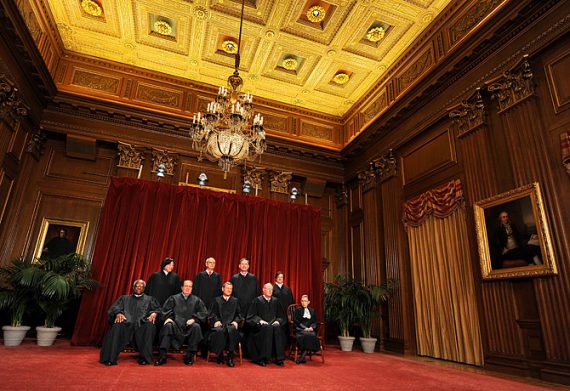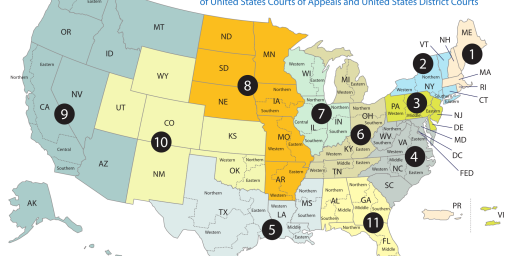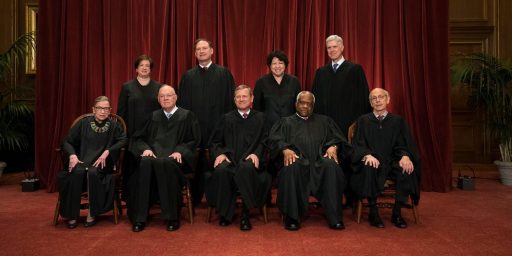Crunch Time For The Supreme Court
With two weeks left in June, the Supreme Court is likely to be in the news quite a lot.
As we head into the last two weeks of June, it is once again time for the Supreme Court to start handing down the most controversial, monumental, and significant opinions of the October 2011 Term. It’s an annual exercise, of course, or at least it has become one over the past couple decades. Whether it’s abortion or gun control, or any other number of issues, the Court has, perhaps tactically, waited until the final days of its term before handing down the decisions that area likely to generate the most public interest. Partly, this is a function of the fact that the cases that generate the most public attention are also the cases that involve complicated legal issues that require the Justices and their clerks to spend significant amounts of time involved in research, writing, debate, and discussion. If it’s a case where the final resolution is closely divided, then it’s likely that there are a number of dissenting and concurring opinions that are also being drafted and, until all of those are done, the decision isn’t ready to be handed down. And, of course, there’s also the perhaps not insignificant possibility that the Justices themselves find the idea of dropping the controversial opinions on the same day they’re leaving town for summer vacation to be, well, convenient.
Whatever the reason, it’s become the common practice for the Court for the past 25 years or so at least, and this year isn’t any different. In fact, as of this evening there are 14 cases that have been argued before the Supreme Court that have yet to be decided. Many of them are cases that the average American isn’t going to have much interest in, although they will no doubt have their own impact on the law at some point down the road. However, there are a small handful of cases still sitting out there undecided each of which is going to generate major headlines, and at least two of which are likely to have an impact on the 2012 elections.
- The ObamaCare Cases — There really isn’t much more that can be said about these cases that hasn’t already been said. I covered the Supreme Court arguments back in March in a preview post, as well as a summary of the arguments over the applicability of the Anti Injunction Act on Day One, the Constitutionality of the mandate on Day Two, and the issue of severability on Day Three. I also did a wrap-up post on the arguments and the political reaction to the same after the were all over, and discussed the question of the impact of overturning the Affordable Care Act on the Supreme Court’s legitimacy. Suffice it to say that this is the case that will define the Court’s term, if not the entire history of the Roberts Court, however long it may last. Politically, the implications for both Republicans and Democrats are unknown and unknowable, but at least initially one has to think that an adverse ruling would be another hit for the President in a month when he has taken quite a few of them.
- Arizona v. United States — This is the case originally file by the Justice Department challenging several provisions of Arizona’s controversial immigration law, which has been mirrored in states such as Georgia and Alabama. The Federal Government was successful at both the District Court and Circuit Court of Appeals level in it’s argument that Arizona was usurping Federal Government perogative, and violating the Supremacy Clause of the Constitution, in several respects. However, as I noted in my post about the Oral Argument before the Supreme Court in this case, several of the Justices appeared at least somewhat sympathetic to some of the arguments that were being made on behalf of Arizona, possibly indicating that they’d be willing to uphold at least part of the law. Politically, the outcome in this case will be important because of the impact that the Latino vote will have in several of this year’s Swing States. Whichever way the case goes, the GOP needs to be careful about how it responds to the outcome.
- The Stolen Valor Act Case — James Joyner and I have both written several times here at OTB about the case of Xavier Alverez, a man who had been elected to a minor office in California and later made a claim that he had won the Congressional Medal Of Honor during the course of a public meeting. That claim was a lie, and Alvarez ended up being prosecuted under a law called the Stolen Valor Act that made it a Federal crime to falsely claim a military honor that one has not received. Alverez had been convicted at trial, but his conviction was reversed by a panel of the 9th Circuit Court of Appeals and, eventually, in an en banc ruling by the entire 9th Circuit. The case was appealed to the Supreme Court and, the oral argument was interesting to the extent that many of the Justices seemed to be struggling to find a way to uphold the law without unduly restricting the First Amendment. As I’ve noted before, of course, oral argument isn’t always a good indication of how the Court will decide a case, and it’s worth noting that the Roberts Court has been especially united over the past several years in striking down restrictions on speech even in the most egregious cases (see, for example, the Westboro Baptist Church case.) The only dissenter in those cases has been Justice Alito. The tea leaves are, as always, hard to read, but I think it’s more likely that the 9th Circuit will be upheld here than anything else.
- Federal Communications Commission v. Fox Television Stations, Inc et al — This is the “fleeting expletives” case, arising out of a broadcast of the Billboard Music Awards in 2007 and the question of whether a broadcaster can or should be held responsible for allegedly indecent language used by a celebrity in a live television broadcast. Perhaps not the most important First Amendment case ever, but if the Court were to uphold the FCC fines administered in this case, it would be a significant, and I would argue inappropriate, expansion of government authority over broadcasting. Not surprisingly, the Broadcast Nannies at groups like the Parents Television Council have filed amicus briefs supporting the FCC’s position.
Those are the four big cases, but SCOTUS blog highlights two more worthy of attention:
Miller v. Alabama and Jackson v. Hobbs
Argued separately on March 20, 2012
Plain English Issue: Whether a sentence of life without parole for someone who was convicted of murder when he was fourteen violates the Constitution’s prohibition on cruel and unusual punishment.
The Supreme Court convenes tomorrow at ten for its next decision day and is likely to announce several more such days over the coming two weeks. Stay tuned, because it’s going to be an interesting two weeks in the legal world.







Too bad it is the John Robert’s SCOTUS that will be calling “Balls and Strikes” with a newly defined batter’s box shaped like a right-wing trapezoid.
…Lets all hope Justice Kennedy still has some sanity.
…What a circus.
I guess it all depends on your perspective and POV, as to how a person hopes Justice Kennedy rules.
To a social progressive, he loses his sanity if he votes the ACA unconstitutional.
However, to a more conservative mind he retains his integrity if he votes the ACA unconstitutional, as well as sanity in not being unduly influenced by a very weak argument brought by the government, defending the legitimacy of this knee-jerk, unpopular, passed on Christmas Eve, by a 100% partisan, arm-twisted vote.
The SCOTUS is political – 5-4 decisions are the rule. This is why respect for the court is in decline. It’s become obvious that the court is no longer a neutral arbitrator but an ideological institution.
Also, the case about Mayor Bloomberg’s soft drink laws!
Here as in other contexts the OCD chattering classes could learn a lot from Zombieland. No need to fret over items over which you have no control whatsoever.